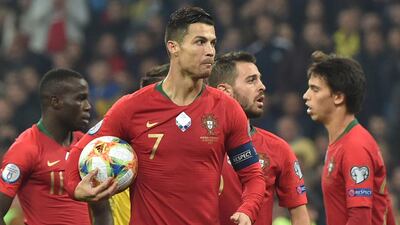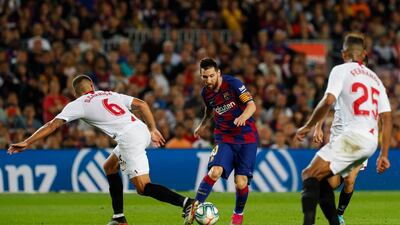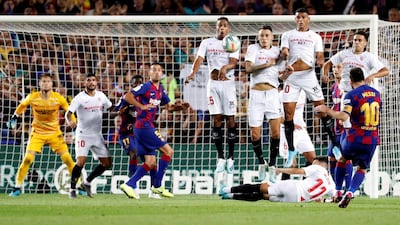There is going to come a time when we don't have Lionel Messi and Cristiano Ronaldo dominating as they have done for the past decade.
They won't be up for the Ballon d'Or award, they won't be dueling for Europe's Golden Boot and they won't be putting on yet another Champions League masterclass.
Thankfully, for the majority of football fans who admire their talent and achievements, that time seems a way off yet. But are we starting to see the first signs of decline?
Slow start for Barcelona and Juventus
By their lofty standards, the 2019/20 domestic season hasn't started in a blaze of glory for either Messi or Ronaldo.
The Argentine has been hampered by calf and thigh injuries during the opening months and has scored only once in five appearances.
By this stage last season, Messi had already netted 11 times, though he was starting every match.
For a player who had scored more than 40 goals in each of the past 10 seasons, this time around it feels as though he may not have it quite as easy. Barcelona are second in La Liga, two points behind Real Madrid, but have already lost twice in the league as they search for the right mix after adding Antoine Griezmann to their forwards line over the summer.
For Ronaldo, his days of scoring hat-trick after hat-trick came to an end when he joined Juventus last season.
Twenty-one Serie A goals in 31 games and 28 in 43 across competitions is impressive - but slightly less so when you consider that he passed 40 goals the previous eight seasons, and often at better than a goal a game. He finished just fourth in the Serie A scoring charts last term, behind a 36-year-old Fabio Quagliarella
This season, he's netted three times in his first six league matches and added one more in two Champions League fixtures giving him a 50 per cent strike rate. That's slightly up on last season, when he managed three in his first eight games.
700 and counting
The one area where Ronaldo continues to perform in beast-mode is international football.
After netting a hat-trick in the Nations League against Switzerland in the summer, Ronaldo has banged in seven more goals for Portugal in four Euro2020 qualifiers, including four against Lithuania.
Flat-track bully? Yes, the argument can be made that he hasn't exactly been tearing apart Europe's finest defences in putting the likes of Luxembourg to the sword.
Still, he became only the sixth player to reach 700 career goals with his penalty against Ukraine on Monday, and now has 95 for Portugal.
In club football he has 605 - one goal ahead of Messi.
“The records come naturally,” Ronaldo said after the Ukraine match. “I don’t go after them, they come after me. I’m already thinking about tomorrow, about scoring No 701 in my next match.”
Is age just a number?
This is Messi's 16th season in the Barcelona first team squad, while it is 17 years since Ronaldo had scouts flocking to Sporting Lisbon.
Both have avoided serious, season-ending injuries throughout their career, but in doing so, other parts of the body have had little rest.
Ronaldo, 34, is approaching an astounding 1,000 career matches - Messi is on 828 appearances - and has said previously that he could play until he is 40 or 41.

But to carry on at the top level, adjustments to their playing styles are inevitable.
By moving to Serie A, Ronaldo has arguably already taken a step down. Juventus are largely untouchable and are again top of the league and unbeaten. He's an important part of a well-oiled machine that simply keeps churning out results. While his prowess in front of goal remains undimmed, and his physical stature appears as impressive as ever, expect to see less of the half-pitch sprints and dribbles, and possibly more of a fox-in-the-box style player develop.
Barcelona, meanwhile, tend to feel Messi's absence more. It's no coincidence that their results have improved since the one-club man returned from injury this season.
Like Ronaldo, there could be less individual brilliance in theyears to come, and more of a focus on working in and around the penalty area rather than both starting and finishing moves.
Messi's top recorded speed in his two Champions League appearances so far this season is down at 27km/h - even Luis Suarez, a player often accused of being in physical decline, has topped that with 28km/h. Liverpool's countering attacking specialists Mohamed Salah and Sadio Mane have reached 31km/h and 32km/h respectively. The top recorded speed during a season is usually around 34km/h. Ronaldo has also hit 31km/h.
Suffering from burnout?
While both players were put through the rigours of full seasons as teenagers, their health has, generally, held up compared to other leading lights.
Just look at the type of player Wayne Rooney had become by the age of 30. From being the golden boy of English football at 18, he was struggling to make an impact in the Premier League a decade later and is now set to perform in the English second tier for Derby County from January.
It was a similar case for Michael Owen, whose career ended with a whimper at Stoke City after years of injury problems which were said to be exacerbated by playing too much too young. By 30, Owen was a shade of the player who took the 1998 World Cup by storm.
The pretenders ...
What will the football landscape look without its two titans? Not entirely barren.
We can expect Kylian Mbappe to continue his meteoric rise, while Salah and Harry Kane have dominated the English scoring charts the past few years.
And before Messi and Ronaldo move on, we're likely to be saying goodbye to another goalscoring legend ...











